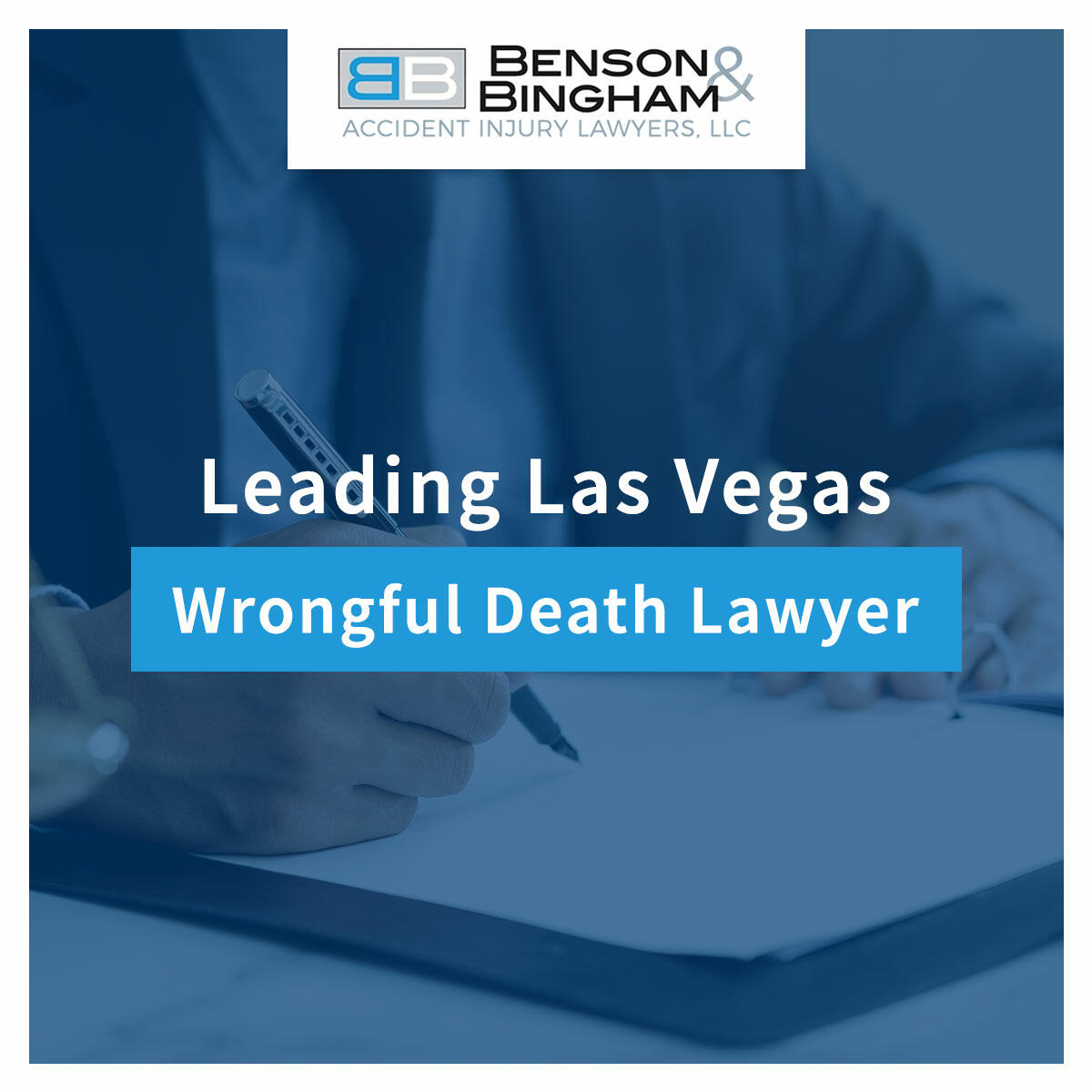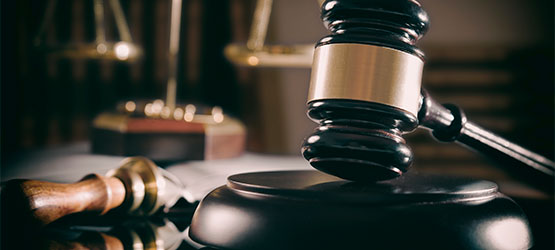Understanding Wrongful Death Law In Las Vegas
If your loved one has passed away and you believe it was due to the negligence of another party, consult with a Las Vegas wrongful death attorney at Benson & Bingham Accident Injury Lawyers, LLC. We understand that wrongful death is a complex, painful situation, and are well-versed in Nevada laws regarding wrongful death. Let us offer sound legal counsel and assurance that justice will be done.
What Is Considered Wrongful Death?
The term wrongful death is defined in the legal realm as the death of a person caused by the wrongful act of another person. The type of acts listed in this definition include:
- Negligent acts, such as careless driving or a premises liability complaint.
- Intentional acts, such as assault.
- Strict liability actions, which apply in defective products cases or cases in which the defendant engaged in risky behavior that caused the plaintiff’s death.
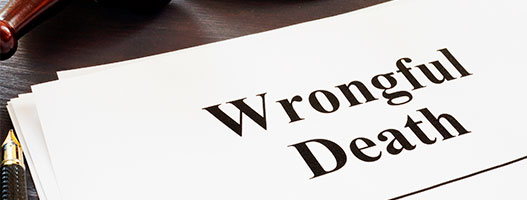
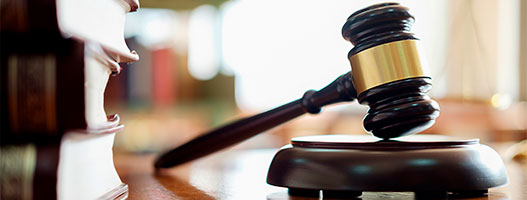
Who Can File a Wrongful Death Claim?
The legal process by which the family members of the decedent are permitted to recover damages is known as a wrongful death lawsuit. This is a civil action that generally must be filed in court within two years after the death occurs. Those who are permitted to file a wrongful death lawsuit in Las Vegas include the decedent’s spouse or domestic partner, the decedent’s children, the parents of the decedent if there is no spouse or children, and a personal representative of the decedent’s estate.
Nevada Wrongful Death Statute Of Limitations
The statute of limitations in Nevada regarding a wrongful death lawsuit is within two years of the date of the person’s death, or the date that the death was discovered. A competent wrongful death lawyer in Las Vegas can guide you through the steps of the filing process.

Consult With Our Wrongful Death Lawyers
For A Free Case Evaluation
Why Hire Our Las Vegas Wrongful Death Attorneys?
Our Skilled and Compassionate Attorneys Will Help You Obtain Compensation
Wrongful death cases are not only devastating to survivors, but also they are complicated. An experienced wrongful death attorney can give advice about the case, including who has the right to bring a claim, what the claim can include, and whether to set up an estate. The experienced attorneys at Benson & Bingham Accident Injury Lawyers, LLC have offices in Las Vegas and deep roots in the community.
What Types Of Damages Can I Recover From A Wrongful Death Claim?
Damages That Las Vegas Courts Commonly Award Include Compensation For:
Medical & Funeral Expenses
Medical costs resulting from the treatment of the decedent’s final injury, as well as funeral, burial and/or cremation expenses.
Lost Wages & Loss Of Future Income
Lost wages and benefits, including those the deceased would have likely earned, had he or she lived to retirement age.
Loss Of Companionship
Loss of companionship, affection, guidance, and care that was provided to the family member by the deceased.
Family Member’s Grief & Sorrow
Heirs can also recover damages from multiple non-economic damages under Nevada law, including pain and suffering, loss of consortium, and sorrow and grief.
Loss Of Consortium
The significant other of the decedent can receive compensation for their loss of love, companionship, comfort, sexual relations, and the ability to have children.
Pain & Suffering Of The Decedent Prior To Death
In cases where the decedent experienced significant pain or trauma prior to their death, their loved ones can recover damages for the pain and suffering.
Meet Our Experienced Team Of Lawyers
Each attorney at Benson & Bingham carries decades of experience representing clients in all types of personal injury and wrongful death cases. Our dedication to bringing justice and closure as we advocate for our clients is evident throughout the legal process, and we are proud to offer personal representation and close communication to you.
Meet the Attorneys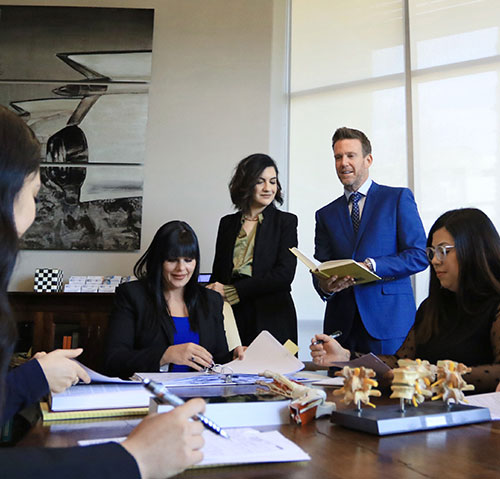
Nevada’s Most Trusted Attorneys For Wrongful Death Cases
Client Testimonials
I suggest using Benson & Bingham if you’re in need of an injury accident attorney! They have an amazing staff and made the entire process easy and stress free handling my case with compassion and a remedy of great efficacy!
I picked this place and I’m so glad that I did. Ida was very helpful and professional. If I had questions they were answered. I would definitely use them again in the future and I would definitely recommend them to anyone. Thank you for your service I appreciate it.
What I love about Benson & Bingham, especially from my attorney, Lina, I felt informed and cared for my health. She made sure I was ok at all times through my injury. I hate I had the accident, but it was comforting to know I was well taken care of.
Read More Reviews
Award-Winning Wrongful Death Law Firm In Las Vegas
Benson & Bingham: Extensive Experience With Wrongful Death Cases
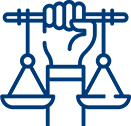
Total Settled By Verdicts For Clients
Our Las Vegas law firm has recovered almost $500 million in total for clients seeking compensation and damages in personal injury cases. We fight for justice and maximum compensation.
Wrongful Death: Parking Lot Accident
Recently, Benson & Bingham advocated for a client who had lost their loved one in a parking lot accident. We utilized our knowledge and experience, and were able to recover over $400,000 for their pain, suffering, and losses.
Wrongful Death: Maximum Policy
In Nevada, the maximum settlement a family member can receive for the wrongful death of their loved one is typically $300,000, depending on the circumstances. At Benson & Bingham, we will always fight for maximum compensation for you.

Visit Our Las Vegas Wrongful Death Law Firm Near You

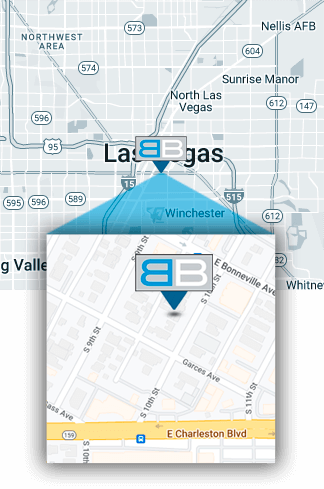
Las Vegas, NV 89101
As an experienced legal team, Benson & Bingham Accident Injury Lawyers, LLC is prepared to tackle difficult insurance companies, pursue investigators, gather critical facts leading to your loved one’s death, and help establish an estate. Schedule a no-obligation consultation today!
What Must I Prove To Succeed In A Las Vegas Wrongful Death Lawsuit?
The At-Fault Party Owed The Deceased a Duty Of Care
You must show that the at-fault party was liable for the death. Liability is proven by establishing the following elements of negligence:
- The at-fault party owed the deceased a duty of care.
- There was a breach in the duty of care.
- This breach caused the deceased’s death.
In addition to proving liability for your loved one’s death, you must also show the damages that the deceased’s family experienced, such as expenses and non-economic life impacts.
There Was A Breach In The Duty Of Care That Lead To The Deceased’s Death
In order to prove that another party was at fault for the wrongful death of your loved one, you must be able to show without doubt that they failed to act like a reasonable person, and that this action caused injury and resulting death. The jury and court will use the typical standard of behavior to determine if the accused party was truly negligent.
Proof Of Economic & Non-Economic Damages Experienced By The Family
It is essential to your claim to be able to prove economic and non-economic damages. Economic damages include physical strains such as vehicle repairs, doctor bills, and financial strain from daily bills, while non-economic damages include emotional distress, suffering, and the loss of relationship. Using paperwork such as receipts, medical records, bills, and vehicle repair estimates provides reasonable proof for your claim.
Common Causes Of Wrongful Death Scenarios
Fatal Motor Vehicle Accident
Our Las Vegas accident injury law firm represents clients whose loved one was struck and killed in a vehicle accident. They may have been a passenger, another driver, or a pedestrian.
Construction Accidents Or Unsafe Work Conditions
Improper precautions on a worksite or unsafe practices create an environment where injury can easily occur. Faulty, unmaintained equipment is another cause of negligence and wrongful death.
Nursing Home Abuse Or Neglect
If your loved one was in a nursing home that was understaffed, poorly trained, or fostered an environment of abuse that led to their death, you could receive maximum compensation.
Product Liability Accidents
When a product is proven to be defective whether through its design, assembly, or marketing, and results in someone losing their life, a wrongful death claim can be filed.
Defective Machinery or Equipment
Equipment that has not been properly maintained, cared for, or stored that causes someone to die as a result, the decedent’s family is entitled to compensation from the responsible party.
Bicycle Accidents
For a bicycle fatality to be considered a wrongful death case, it must be proven that someone’s negligence caused the accident. This could be through reckless driving or impaired driving.
Pedestrian Accidents
When pedestrians are struck and killed by a moving vehicle, it is considered negligence and wrongful death. Our Las Vegas reckless driving attorneys can help you file a claim.
Medical Malpractice
Medical malpractice means that a medical provider’s carelessness led to the death of your loved one as their patient. You are entitled to compensation for the pain and suffering.
Contact Our Wrongful Death
Law Firm Today For A Free Consultation
FAQs About Las Vegas Wrongful Death Claims
Who Is Eligible To File a Wrongful Death Claim In Las Vegas?
Under Nevada law, a deceased individual’s heirs and personal representatives can bring a claim for wrongful death. The law defines “heir” as a person who would be entitled to the deceased person’s property under state law if the decedent died intestate (that is, without a will). In Nevada, that could be the spouse, domestic partner, parents, children, and siblings of the deceased person. Heirs are discussed more here.
Specifically, who can bring such claims is covered under NRS 134 or “succession” statutes. This outlines who is a legal heir and had rights to bring a lawsuit. Family relationship may not be enough, and each family member has vested rights. For example, Under NRS 134 parents may lose claims if the deceased child is married or has children. Therefore, it is important to recognize who has legal rights to pursue the wrongful death claims under NRS 134 as a first step in the wrongful death analysis.
The law is complicated, so consult an attorney to determine your eligibility to file such a claim.
Is a Wrongful Death Claim Different Than a Criminal Trial?
Wrongful death claims and criminal claims are two separate legal issues. While wrongful death is based on proving the negligence of another party that ultimately caused the death of your loved one, it refers to accidents and mistakes that were not intentional. When someone is killed intentionally by another person, the state prosecutes the case and it is handled in criminal court.
Do You Need an Attorney for a Wrongful Death Claim In Las Vegas?
To ensure your best chance of success, you should retain an attorney to file your Las Vegas wrongful death lawsuit. These cases are often complex and time-consuming. Your attorney can:
- Determine all sources of liability and all insurance resources that are available for compensation.
- File court-required paperwork in the proper jurisdiction and representation at all pre-trial conferences and hearings.
- Guide you through the legal process as well as advice and information that can help you make important decisions in your case.
- Evaluate your case based on the expenses that you have incurred as well as the ways the loss has negatively impacted your life.
- Collect evidence and witness testimony necessary to prove your claims.
- Consult experts, such as medical professionals or accident reconstruction specialists, to strengthen your case.
- Negotiate to obtain a fair settlement on your behalf.
- In lieu of a fair settlement, litigate your case all the way to trial. This includes the delivery of opening and closing arguments, the presentation of evidence, and the examination of witnesses.
- Assist in collecting your settlement or award.
- Provide further representation if the defendant in your case files an appeal.
Let the experienced Las Vegas wrongful death lawyers at Benson & Bingham Accident Injury Lawyers, LLC, help you understand the legal process of recovering damages after the loss of a loved one. Contact us today for a free case evaluation.
In the Event Of Wrongful Death Should I Contact The Insurance Company First?
If you feel that your loved one has died as the result of negligence, it is vital to contact a lawyer immediately. The first step that must be taken is to determine who is eligible to even file the claim. The right documents must then be completed and filed to start the process. The wrongful death lawyer near you in Las Vegas will help you navigate your next steps.
How Do I Start A Wrongful Death Lawsuit In Las Vegas?
To file a wrongful death claim in Las Vegas, it is vital that the proper steps are taken to ensure the efficacy of your claim. Schedule a free consultation with your lawyer to discuss the situation and determine if you have a viable case. You will then complete and file a petition and a summons specifying that the defendant is being sued and where the lawsuit will be heard.
Are Punitive Damages Recoverable In Wrongful Death Actions?
Punitive damages refer to anything exceeding simple compensation awarded to punish the defendant. Sometimes punitive damages can be recovered, but it depends on the circumstances surrounding each specific case. With an experienced attorney on your side to help you navigate the process, you have the best chance at getting the compensation you deserve for the death of your loved one.
How Much Does a Wrongful Death Lawsuit Cost?
Typically, you can expect your lawyer to take between 33-40% of the total amount awarded for your lawsuit. For example, if you receive $200,000 in damages, your lawyer could take $66,000-$80,000. At Benson & Bingham Accident Injury Lawyers, LLC, you can trust that we are dedicated to representing our clients with integrity and treating them with priority, without taking financial advantage of them in the process.
How Do You Prove Negligence in a Wrongful Death Case?
Winning a wrongful death lawsuit in Las Vegas hinges entirely on the ability to prove that your loved one died as the result of negligence. You must prove that someone truly was negligent, and that their negligence then caused the death. Benson & Bingham will help you prove the defendant owed a duty of care, that the defendant breached their duty, and your family member died as a result.
How Can A Las Vegas Wrongful Death Lawyer Help?
After a loved one has died, you may be struggling to cope with the aftermath. You are likely facing upheaval, loss of relationship, emotional struggles, mental struggles, and even physical struggles, affecting every area of your life including your career, family life, and personal relationships. A wrongful death lawyer will determine if you have grounds to file a lawsuit, and will take all the stress off you by negotiating for compensation on your behalf.
Read More On Wrongful Death Law Inside Our Personal Injury Blog
Contact Benson & Bingham Wrongful Death Lawyers For A Personalized Case Consultation
Locate Us
Our Locations
Enter your ZIP code to see which location is closer to you
